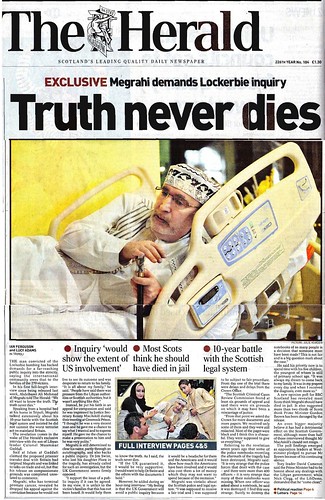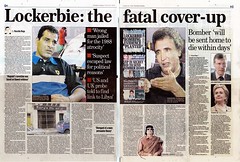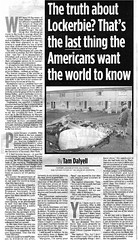THE HERALD newspaper in an exclusive interview with Abdelbaset Ali Mohmed al Megrahi, the man convicted of the bombing of Pan Am Flight 103 over Lockerbie Scotland in December 1988 reveals today that Mr Megrahi supports calls for a full inquiry into the terrorist attack over 20 years ago that claimed 270 lives.
We at Scottish Law Reporter support the call for a far reaching, fully independent inquiry into the Lockerbie case.
The Herald newspaper reports :
EXCLUSIVE: Megrahi demands Lockerbie inquiry
By Ian Ferguson and Lucy Adams in Tripoli
The man convicted of the Lockerbie bombing has backed demands for a far-reaching public inquiry into the atrocity, saying the international community owes that to the families of the 270 victims.
In his first full-length interview since being released last week, Abdelbaset Ali Mohmed al Megrahi told The Herald: "We all want to know the truth. The truth never dies."
Speaking from a hospital bed at his home in Tripoli, Megrahi talked extensively about his 10-year battle with the Scottish legal system and insisted he did not commit the worst terrorist act on mainland Britain.
The revelation comes in the wake of The Herald's exclusive interview with the son of Libyan leader Colonel Muammar Gaddafi.
Saif al Islam al Gaddafi claimed the proposed prisoner transfer deal with Britain had targeted Megrahi and was linked to talks on trade and oil, but that his release on compassionate grounds was completed unrelated to commerce.
Megrahi, who has terminal prostate cancer, revealed he dropped his appeal against the conviction because he would not live to see its outcome and was desperate to return to his family. "It is all about my family," he said. "People have said there was pressure from the Libyan authorities or Scottish authorities, but it wasn't anything like this."
Instead, he put his faith in an appeal for compassion and said he was impressed by Justice Secretary Kenny MacAskill during their meeting at Greenock Prison. "I thought he was a very decent man and he gave me a chance to say what I wanted and to express myself. He gave me the chance to make a presentation to him and he was very polite."
Megrahi is still determined to clear his name, partly through an autobiography, and also backs a public inquiry. Dr Jim Swire, who lost his daughter Flora in the tragedy, has already called for such an investigation, but the UK Government seems firmly opposed.
"I support the issue of a public inquiry if it can be agreed. In my view, it is unfair to the victim's families that this has not been heard. It would help them to know the truth. As I said, the truth never dies.
"If the UK guaranteed it, I would be very supportive. I would want to help Dr Swire and the others with the documents I hold."
However, he added during an hour-long interview: "My feeling is that the UK Government will avoid a public inquiry because it would be a headache for them and the Americans and it would show how much the Americans have been involved and it would also cost them a lot of money which they may not want to spend because of the recession."
Megrahi was vitriolic about the Scottish police and legal system. "I was supposed to receive a fair trial and I was supposed to be subject to fair procedure. From day one of the trial there were delays and delays from the Crown Office. "The Scottish Criminal Cases Review Commission found at least six grounds of appeal and said there were six grounds on which it may have been a miscarriage of justice.
"From that point we asked the Crown for more documents and more papers. We received only some of them and they were still redacted. Most of the pages were black and I think this is shameful. They were supposed to give us everything."
Referring to the revelation seven years ago that some of the police notebooks recording the aftermath of the tragedy had been destroyed, Megrahi said: "It is very strange that the police forces that dealt with the case - and there were more than 400 officers - it is very strange that many of their notebooks went missing.
When one officer was asked about a notebook, he said it was destroyed. I find this very strange. Surely to destroy the notebooks of so many people is a decision that someone must have been made? This is not fair and is a big question mark about the case."
He said his priority now is to spend time with his five children, the youngest of whom is still of primary school age. "It was always my dream to come back to my family. It was in my prayers every day and when I received the diagnosis, even more so."
A new opinion poll for BBC Scotland has revealed most Scots think Megrahi should have died in jail. It also suggested more than two-thirds of Scots think Prime Minister Gordon Brown has been damaged by the release.
An even bigger majority believe it has had a detrimental effect on the Scottish Government, although more than half of those interviewed thought Mr MacAskill's should not resign. The poll findings emerged as opposition leaders at Westminster pledged to pursue Mr Brown because of his continuing silence.
Tory leader David Cameron said the Prime Minister had to be honest about any dealings with the Libyan government, while Nick Clegg, of the LibDems, demanded that he "come clean".
READ THE FULL INTERVIEW IN TODAY'S HERALD NEWSPAPER OR ONLINE HERE ...



